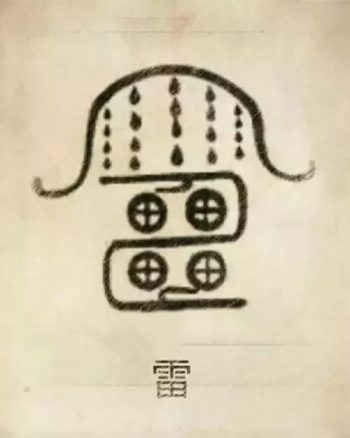The Lei(léi) surname is one of China’s oldest family names, weaving together mythology, nature worship, and multicultural integration. For readers interested in Chinese history and genealogy, the Lei surname offers a fascinating glimpse into the evolution of Chinese civilization and its enduring cultural diversity.

Ⅰ、Origins of the Lei Surname
1. Descendants of Fang Lei
The Lei(léi)surname traces its earliest origins to Fang Lei, a ninth-generation descendant of the legendary Emperor Yan . Fang Lei aided the Yellow Emperor in defeating the rebel Chi You and was granted the territory of Fangshan (modern-day Songshan, Henan Province). His descendants adopted "Lei" as their surname, forming the primary branch of the Lei lineage.
2. Nature Worship and Totemism
The origin of the surname Lei is also related to the ancient worship of the thunder god. Some tribes adopted "Lei" as a totem, and their descendants later adopted it as a surname.
3. Ethnic Integration
During the Northern and Southern Dynasties (420–589 CE), the Qiang and Xianbei peoples adopted the Lei surname.
In southern China, the Yao and She ethnic minorities have long used the Lei surname while preserving unique cultural traditions, such as the Yao’s "Panhu Festival."
Ⅱ、Historical Figures of the Lei Surname
1. Science and Medicine
Lei Gong: A mythical physician revered as the "Ancestor of Medicine," whose theories influenced traditional Chinese medicine.
Lei Xiao: Authored The Art of Drug Processing, a foundational text on herbal medicine techniques still used today.
2. Cultural Icons
Lei Haiqing: A Tang Dynasty musician celebrated as the "God of Music." He became a symbol of loyalty after refusing to perform for rebel forces during the An Lushan Rebellion.
Lei Fada: A Qing Dynasty architectural master whose family, known as the Yangshi Lei, designed iconic structures like the Forbidden City’s Three Great Halls.
Lei Huan: Proficient in astronomy, he predicted and discovered the two legendary swords, Longquan and Tai'a, which were later remembered as "Dual Sword Family's Reputation".
3. Modern Visionaries
Lei Jieqiong: A pioneering sociologist and educator who contributed to China’s social reforms.
Lei Jun: Founder of Xiaomi Corporation, a global leader in consumer electronics and innovation.
Ⅲ、Cultural Significance
1. Clan Values and Teachings
Ancestral Halls: The Qianrang Hall ("Hall of Humility") honors Lei Yi, an Eastern Han official known for his integrity and selflessness.
Family Mottos: Many Lei clans emphasize values like "respect for elders," "harmony among siblings," and "balancing farming and scholarship," as recorded in genealogies from Jiangxi and Fujian.
2.Migration and regional integration
Originating in Henan, the Lei surname spread westward to Shaanxi during the Han Dynasty and later migrated south to Jiangxi and Fujian. By the Ming and Qing dynasties, Lei families had settled in Guangdong, Guangxi, and Southeast Asia. Today, approximately 3.7 million people bear the Lei surname, concentrated in Sichuan, Hunan, and Shaanxi.
4.Symbolism in Folklore
Among the She ethnic group, the Lei surname is tied to the myth of Panhu, a divine dog-turned-deity. Their traditional clothing and songs preserve this unique cultural narrative.
Ⅳ、Social Impact
1.Historical Contributions
Agriculture: She ethnic Lei communities developed innovative farming techniques for mountainous regions in Fujian and Guangdong.
Architecture: The Yangshi Lei family’s architectural blueprints are UNESCO-recognized treasures, showcasing China’s engineering brilliance.
2.Cultural Bridges
Overseas Lei clan associations (e.g., Singapore Lei Clan Association) promote cultural exchange, while modern figures like Lei Jun bridge technology and tradition.
3.Modern Relevance
Phrases like "swift as thunder" (léi lì fēng xíng) and "earthshaking power" (léi tíng wàn jūn) have transformed ancient thunder symbolism into metaphors for efficiency and determination in contemporary Chinese.
Conclusion
The Lei surname is a living chronicle of Chinese civilization, embodying ancient reverence for nature and the spirit of multicultural harmony. From Lei Gong’s medical wisdom to Lei Fada’s architectural marvels, from Lei Jieqiong’s social advocacy to Lei Jun’s tech innovations, this surname continues to shape China’s cultural and technological landscape. Today, Lei communities worldwide honor their heritage while contributing to fields as diverse as ecology, education, and AI—proving that even the oldest symbols can spark new brilliance.